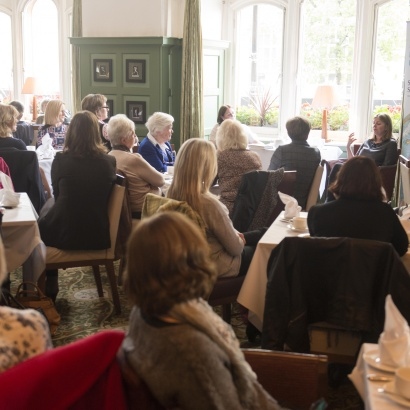 Chapter & Verse Blog
Chapter & Verse Blog
The Manchester Literature Festival Blog
Review: Tea at the Midland with Rachel Cooke
‘So, why did you come along today?’
I’m sitting at a table with three other women, all a little older than me.
‘Ooh, tea at the Midland, definitely. We came to one last year as well. It’s so nice here!’
The others chip in.
‘I read Rachel Cooke in the Observer.’
‘And the subject matter, I like the sound of the book.’
Let’s take these points in turn. The Midland is quite lovely, and I relish being here, on a Thursday afternoon, at a little table in the Wyvern Room. There are teacups and plates waiting, but we don’t get the scones until we’ve listened to the talk.
Rachel Cooke is indeed a fine writer, and it’s not surprising that she should be so appreciated here in the realms of Guardian-land. She also turns out to be a wonderful speaker, relaxed, fluent and funny. I could have listened to her for twice as long.
And the subject matter? Cooke’s new book, Her Brilliant Career: Ten Extraordinary Women of the Fifties, may have explained the preponderance of ladies of a certain age filling the tables and listening with pleasure whilst waiting for their tea and scones. All I can say is, you men and youngsters really missed out.
Picture a woman in the 1950s and you’ll probably come up with a housewife in a flowered pinny, mixing up a batch of fairy cakes whilst trilling about how wonderful her new vacuum cleaner is. In a book about the ‘New Elizabethans’, published in the year of the coronation, there were 42 men and five women. And these five included two actresses and a ballerina. Cooke went looking for a more representative sample.*
Was it, asked BBC Radio Manchester presenter Sam Walker, hard to find ten women to write about? No, the difficulty was thinning down the field. And these are, Cooke says, really eye-popping women: fearless, pragmatic and joined by a common thread of ‘utterly rapacious determination.’
The main trouble in researching the book was the lack of printed material, according to Cooke. Histories tend to be written by men, and the women themselves have largely been forgotten, any books they had produced now out of print. “I spent hours in the British Library and newspaper libraries, and more persuading the families to talk.”
The process of detection was as fascinating as the stories themselves. These women had enjoyed their war, “trousers, no stockings, and lots of sex,” and the absence of men had given them the opportunity to get started in careers earlier generations were kept out of. They tended towards complicated private lives, and lived in what Cooke categorised as “pre-guilt days. They didn’t agonise over their choices like we women do today.”
As the scones arrived (and they were worth waiting for), I reflected that my mother, who worked full time and never wore a pinny, came directly in line from these women. It also struck me that we were all sitting here, listening to stories of inspirational women, surrounded by photographs of men engaged in sporting prowess. Sigh. There’s still work to be done. I’m going to start by reading this book.
(I’ve just looked up the list from the BBC series ‘The New Elizabethans’, broadcast for the Queen’s Diamond Jubilee. It includes 47 men and 15 women. Two of these are royal, and one is Barbara Windsor. We need more books like this one.)
About the writer: Sarah Jasmon writes, reviews and interviews at sarahjasmon.com. Her own first novel comes out this time next year.


